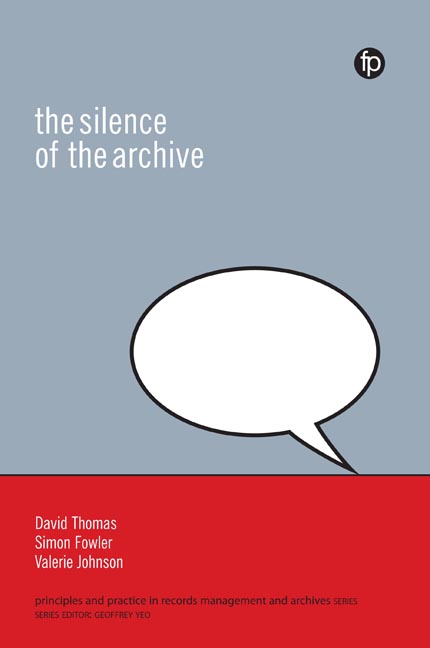Book contents
1 - Enforced silences
Published online by Cambridge University Press: 08 June 2018
Summary
Introduction
Archival institutions are not neutral places. Nor are their archives neutral. Nor indeed is the subject of this book: what the archives do not have.
This may sound platitudinous: something a history student might write in an essay. This chapter, and the next, explore why this has long been the case in the context of traditional, one might say analogue, archives. In this chapter we will consider how archival institutions have traditionally failed to meet the needs of host communities and why there have been great gaps in the collections, and in archival collecting policies. In the words of the great French historian Marc Bloch, the records of a society are ‘witnesses in spite of themselves’ (Bloch, 1953, 51). That is, on the one hand the records become witnesses in the evidentiary sense arising from the process of record making and record keeping and, on the other, also bear witness to the lives of those who are the subjects of the records.
The historian and anthropologist Michel-Rolph Trouillot (2015, 48, 52) suggests that archival institutions organize facts and sources and condition the possibility of existence of historical statements. Their work of collection ‘is an active act of production that prepares facts for historical intelligibility. They are the institutionalised sites of mediation between the socio-historical process and the narrative about that process.’
Sources and archives are neither neutral nor natural. They are created. It is this that is the reason for so many silences. Archival creation is, of course, a human process, starting from individuals who produce the records, continuing through the selection process used by archivists and ending up with cataloguing and delivery of documents.
Indeed, archival institutions may literally impose silence on records. Users sit in reverential silence, often beneath notices asking them to be quiet, silently reading from documents. But some at least of the documents they read were meant to be read aloud or, in the case of history testimony, meant to be listened to. From the mid-16th century onwards, witness statements in English and Welsh legal cases were increasingly recorded in writing under oath before the trial. The documents produced in this way and which still survive came to replace the witnesses’ live appearance in court during the trial.
- Type
- Chapter
- Information
- The Silence of the Archive , pp. 1 - 40Publisher: FacetPrint publication year: 2017
- 3
- Cited by



